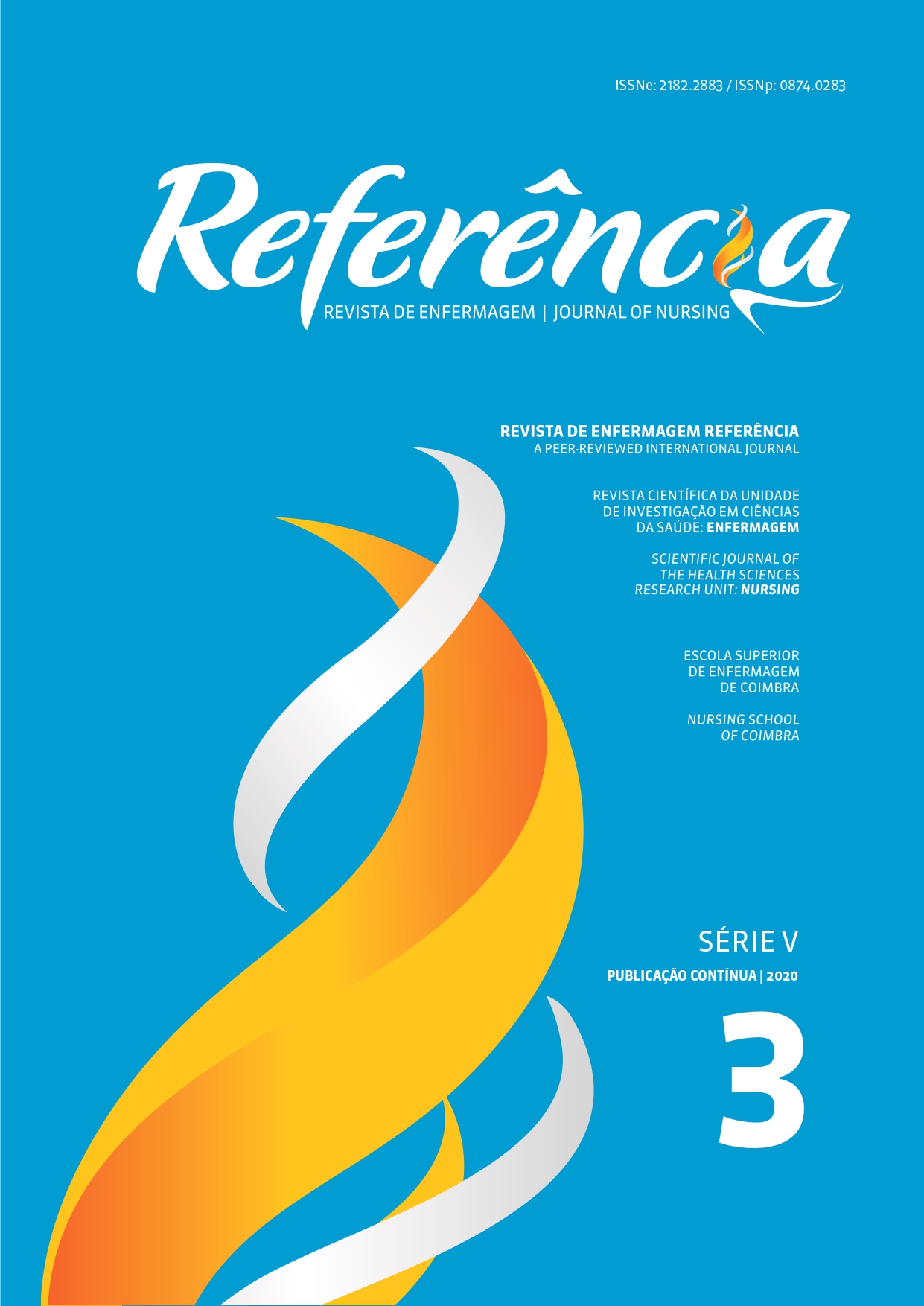Informal caregiver of dependent person in self‐care: burden-related factors
DOI:
https://doi.org/10.12707/RV20013Keywords:
burden, informal caregivers, family, self-careAbstract
Introduction: Societal changes have led to an increasing number of people dependent for self-care, with the need for support from a family member/informal caregiver. The performance of this role can lead to burden and exhaustion.
Objectives: To assess the burden of the dependent person’s informal caregiver and to identify factors associated with caregiver burden.
Methodology: An observational cross-sectional study was conducted with a convenience sample of 164 informal caregivers of people dependent for self-care. The questionnaire included data on the dependent person (sociodemographic and clinical) and the caregiver (sociodemographic, family, professional, experience, information received, and burden using the Zarit Burden Interview).
Results: Most caregivers were women (82.9%), living with the dependent person (70.1%), 62.2% of them had help and spent an average of 105.65 (± 54) hours/week in caring. More than half of the caregivers were severely burdened (57.7; ± 13.9), which was associated with the preparation to provide care and the areas and duration of dependence. More information about the illness and how to care for the dependent person were associated with lower levels of burden.
Conclusion: The factors associated with the severe burden experienced by informal suggest that nurses should invest in preventive interventions.
Downloads
References
Alves, S., Teixeira, L., Azevedo, M. J., Duarte, M., & Paúl, C. (2015). Effectiveness of a psychoeducational programme for informal caregivers of older adults. Scandinavian Journal of Caring Sciences, 30(1), 65-73. Recuperado de https://pubmed.ncbi.nlm.nih.gov/25856726/
Anderson, R., Mikuliç, B., Vermeylen, G., Lyly-Yrjanainen, M., & Zigante, V. (2009). Second European Quality of Life Survey-Overview. Dublin, Ireland: Office for Official Publications of the European Communities. Recuperado de https://www.eurofound.europa.eu/sites/default/files/ef_publication/field_ef_document/ef0902en_7.pdf
Bouget, D., Spasova, S., & Vanhercke, B. (2016). Work-life balance measures for persons of working age with dependent relatives in Europe: A study of national policies 2016. Brussels, Belgium: European Commission. Directorate-General for Employment, Social Affairs and Inclusion. European Social Policy Network
Cabral, M., Ferreira, P., Silva, P., Jerónimo, P., & Marques, T. (2013). Processos de envelhecimento em Portugal: Usos do tempo, redes sociais e condições de vida. Lisboa: Fundação Francisco Manuel dos Santos
Carretero, S., & Garcés, J. (2011). Psychological interventions to fight against the burden of the informal caregivers. European Psychiatry, 26, 1173. doi.org/10.1016/S0924-9338(11)72878-4
Carretero, S., Stewart, J., & Centeno, C. (2015). Information and communication technologies for informal carers and paid assistants: benefits from micro-, meso-, and macro-levels. European Journal of Ageing, 12(2), 163–73. doi:10.1007/s10433-015-0333-4
Crespo, M., & Rivas, T. (2015). La evaluación de la carga del cuidador: Una revisión más allá de la escala de Zarit. Clínica y Salud, 26(1), 9-16. doi.org/10.1016/j.clysa.2014.07.002
Dixe, M. A., Teixeira, L. F., Areosa, T. J., Frontini, R. C., Peralta, T., & Querido A. I. (2019). Needs and skills of informal caregivers to care for a dependent person: A cross-sectional study. BMC Geriatrics, 19, 255. doi:10.1186/s12877-019-1274-0
Mendes, P. N., Fortes Figueiredo, M. L., Santos, A. M., Fernandes, M. A, & Fonseca, R. S. (2019). Sobrecargas física, emocional e social dos cuidadores informais de idosos. Acta Paulista de Enfermagem, 32(1), 87-94. doi.org/10.1590/1982-0194201900012
Naiditch, M., Triantafillou, J., Di Santo, P., Carretero, S., & Durrett, E.H. (2013). User perspectives in long-term care and the role of informal carers. In K. Leichsenring, J. Billings, H. Nies (Eds). Long-term care in Europe: Improving policy and practice. (pp. 45-80). London, England: Palgrave Macmillan
Oliva-Moreno, J., Aranda-Reneo, I., Vilaplana-Prieto, C., González-Domínguez, A., & Hidalgo-Vega, A. (2013). Economic valuation of informal care in cerebrovascular accident survivors in Spain. BMC Health Services Research, 13(508). doi.org/10.1186/1472-6963-13-508
Pérez-Cruz, M,, Munoz-Martínez, A., Parra-Anguita, L, & del-Pino-Casado, R. (2017) Afrontamiento y carga subjetiva en cuidadores primarios de adultos mayores dependientes de Andalucía, España. Atención Primaria, 49(7), 381-388.
Plöthner, M., Schmidt, K, de Jong L., Zeidler, J., & Damm, K. (2019). Needs and preferences of informal caregivers regarding outpatient care for the elderly: A systematic literature review. BMC Geriatrics, 19, 82-104. doi.org/10.1186/s12877-019-1068-4
Ramón-Arbués, E., Martínez-Abadía, B, & Martín-Gómez, S. (2017). Factores determinantes de la sobrecarga del cuidador: Estudio de las diferencias de género. Atención Primaria, 49(5), 308-313. Recuperado de https://www.elsevier.es/es-revista-atencion-primaria-27-articulo-factores-determinantes-sobrecarga-del-cuidador--S0212656716302487
Rocha, B. M., & Pacheco, J. E. (2013). Elderly persons in a situation of dependence: Informal caregiver stress and coping. Acta Paulista de Enfermagem, 26(1), 50-56. doi.org/10.1590/S0103-21002013000100009
Rodríguez-González, A. M., Rodríguez-Míguez, E., Duarte-Pérez, A., Díaz-Sanisidrod, E, Barbosa-Álvareze, A. A., Claveríaf, A., & Grupo Zarit. (2017). Estudio observacional transversal de la sobrecarga en cuidadoras informales y los determinantes relacionados con la atención a las personas dependientes. Atención Primaria, 49(3), 156-165. Recuperado de https://www.elsevier.es/es-revista-atencion-primaria-27-articulo-estudio-observacional-transversal-sobrecarga-cuidadoras-S0212656716301962
Rodríguez-Medina, M., & Landeros-Pérez, M. E. (2014). Sobrecarga del agente de cuidado dependiente y su relación con la dependencia funcional del adulto mayor. Enfermería Universitaria, 11(3), 87-93. Recuperado de http://www.scielo.org.mx/scielo.php?script=sci_arttext&pid=S1665-70632014000300003
Sequeira, C. (2013). Difficulties, coping strategies, satisfaction and burden in informal Portuguese caregivers. Journal of Clinical Nursing, 22(3-4), 491–500. doi: 10.1111/jocn.12108.
Vandepitte, S., Van Den Noortgate, N., Putman, K., Verhaeghe, S., Faes, K., & Annemansm, L. (2016). Effectiveness of supporting informal caregivers of people with dementia: A systematic review of randomized and non-randomized controlled trials. Journal of Alzheimer’s Disease, 52(3), 929-65. doi: 10.3233/JAD-151011
Zhu, W. & Jiang, Y. (2018) A meta-analytic study of predictors for informal caregiver burden in patients with stroke. Journal of Stroke & Cerebrovascular Diseases, 27(12), 3636-3646. doi.org/10.1016/j.jstrokecerebrovasdis.2018.08.037






















